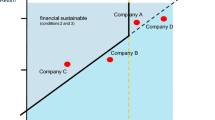Abstract
Globalization plays a vital role in making the financial markets of the world borderless, and as a result, businesses (including small- and medium-sized enterprises) are competing for equity at the best price everywhere possible. Investors and borrowers seek investment opportunities wherever they can obtain the best returns per the risks involved and assess the risks and returns associated with various investment opportunities that require accurate and credible financial information for investors and borrowers [14]. The present study examines the perception of the accounting professionals towards the comparison of Indian GAAP [Generally Accepted Accounting Principles (GAAPs) are those concepts and conventions on which the accounting system is based. The primary objective of these principles is to bring uniformity and consistency in the preparation and presentation of final statements] with IFRS [To create a common accounting language throughout the world, so that businesses and their financial statements can be consistent and reliable across nations, and International Financial Reporting Standards (IFRS) were created by International Accounting Standards Board (IASB) in the year 2001].

Source: Idea taken from Hendriksen [9]
Similar content being viewed by others
Notes
Generally Accepted Accounting Standards (GAAP or US GAAP) are a collection of commonly followed accounting rules and standards for financial reporting. The purpose of GAAP is to ensure transparency and consistency from one organization to another organization.
The Financial Accounting Standards Board (FASB) is a private, non-profit organization standard-setting body whose primary purpose is to establish and improve Generally Accepted Accounting Principles (GAAP) within the United States in the public's interest.
References
Albu CA-V (2010) IFRS for SMEs in Europe—lessons for a possible implementation in Romania. In: Proceedings of the 5th WSEAS international conference on economy and management transformation, II, pp. 659–663.
Ball R. IFRS—ten years later. Account Bus Res. 2016;46(5):572–6.
Byard D (2011) Does mandatory IFRS adoption in the EU level the international playing field between foreign and domestic analysts?. In: ACES working papers.
De Franco GKS. The benefits of financial statement comparability. J Account Res. 2011;49(4):895–931.
Deaconu A (2009) Accounting models in the post-communism Romanian history—an empirical investigation. In: Working paper, Babes-Bolyai University.
Desai RK. The impact of IFRS adoption on the financial activities of companies in India: an empirical study. IUP J Account Res Audit Pract. 2014;13(3):324.
Gray SJ. Have European and US GAAP measures of income and equity converged under IFRS? Evidence from European companies listed in the US. Account Bus Res. 2009;39:431–47.
Harshitha PM (2016) Comparison of Indian GAAP and IFRS in India: an empirical analysis. In: National seminar on “IND-AS: a road map for IFRS in India”, pp. 1–20.
Hendriksen (1992) Accounting Theory, fifth edition, Ricard D (ed). Irwin Inc, USA
Kim J. Voluntary IFRS adoption, analyst coverage, and information quality: international evidence. J Int Account Res. 2012;11(1):45–76.
Lang MM (2010) Earnings comovement and accounting comparability: the effects of mandatory IFRS adoption. In: Working paper, UNC-Chapel Hill.
Li S. Does mandatory adoption of international financial reporting standards in the European Union reduce the cost of equity capital? Account Rev. 2010;85(2):607–36.
Liu C. Are IFRS and US-GAAP already comparable? Int Rev Bus Res Pap. 2009;5(5):76–84.
Liu C. IFRS and US-GAAP comparability before release No. 33–8879: some evidence from US-listed Chinese companies. Int J Account Inf Manag. 2011;19:24–33.
Pacter P. IFRS as global standards: a pocket guide. London: IFRS Foundation; 2015.
Kaur DBP. Comparative analysis of Indian GAAP, IFRS and IND AS. IOSR J Bus Manag. 2019;21(3):55–68.
Prahaladka SG. A study of convergence of Indian GAAP with IFRS and the major carve-outs. IUP J Account Res Audit Pract. 2015;14(4):7–22.
Sharma VB. Adoption of GAAP: an insight into the small and medium enterprises. Indian J Commer Manag Stud. 2015;6(3):63–72.
Sardar VSS. Journey of Indian Corporates from local to international accounting standard: an impact analysis. Int J Finance Account. 2018;7(6):161–85.
Srivastava RS. Implementation of IFRS as Indian Accounting standard for similarity in financial reporting in India: challenges and benefits. Am J Theor Appl Bus. 2019;5(4):90–6.
Stent WBM. “IFRS in New Zealand: effects on financial statements and ratios. Pac Account Rev. 2010;22(2):92–107.
Sun NS. IFRS adoption and accounting quality: a review. Eur Account Rev. 2008;16(4):675–702.
Tsakumis GT, Campbell DR, Doupnik TS. IFRS: beyond the standards. J Account. 2009;207(2):34.
Funding
No funding is involved.
Author information
Authors and Affiliations
Corresponding author
Ethics declarations
Conflict of interest
The authors declare that they have no conflict of interest.
Ethical approval
This paper does not contain any studies with human participants or animals performed by any of the authors.
Informed consent
None.
Additional information
Publisher's Note
Springer Nature remains neutral with regard to jurisdictional claims in published maps and institutional affiliations.
This article is part of the topical collection “Computational Statistics” guest edited by Anish Gupta, Mike Hinchey, Vincenzo Puri, Zeev Zalevsky and Wan Abdul Rahim”.
Rights and permissions
About this article
Cite this article
Puri, N., Singh, H. Indian GAAPs, IFRS, and Its Comparison: An Empirical Critique. SN COMPUT. SCI. 1, 315 (2020). https://doi.org/10.1007/s42979-020-00327-4
Received:
Accepted:
Published:
DOI: https://doi.org/10.1007/s42979-020-00327-4




